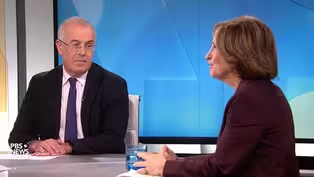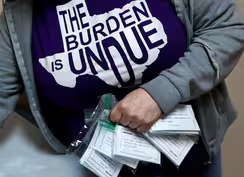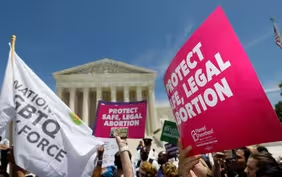
Critics discuss their favorite books of 2023
Clip: 12/15/2023 | 8m 26sVideo has Closed Captions
Critics discuss their favorite books of 2023
With the holidays upon us, you may be hunting for gifts for book lovers in your life. To help narrow down the list, Jeffrey Brown speaks to two NewsHour regulars for our arts and culture series, CANVAS.
Problems playing video? | Closed Captioning Feedback
Problems playing video? | Closed Captioning Feedback
Major corporate funding for the PBS News Hour is provided by BDO, BNSF, Consumer Cellular, American Cruise Lines, and Raymond James. Funding for the PBS NewsHour Weekend is provided by...

Critics discuss their favorite books of 2023
Clip: 12/15/2023 | 8m 26sVideo has Closed Captions
With the holidays upon us, you may be hunting for gifts for book lovers in your life. To help narrow down the list, Jeffrey Brown speaks to two NewsHour regulars for our arts and culture series, CANVAS.
Problems playing video? | Closed Captioning Feedback
How to Watch PBS News Hour
PBS News Hour is available to stream on pbs.org and the free PBS App, available on iPhone, Apple TV, Android TV, Android smartphones, Amazon Fire TV, Amazon Fire Tablet, Roku, Samsung Smart TV, and Vizio.
Providing Support for PBS.org
Learn Moreabout PBS online sponsorshipyou may be hunting for gifts To help narrow down the many# best books of the year lists,## Jeffrey Brown speaks to two "NewsHour" regulars# for our arts and culture series, Canv JEFFREY BROWN: And joining me again this year# are two top readers and reviewers, Gilbert Cruz,## books editor of The New York Times, and Maureen# Corrigan, book critic of NPR's "Fresh Air."
It's nice to see both of you again.
MAUREEN CORRIGAN, NPR Book# Critic: It's goo MAUREEN CORRIGAN: Sure.
Why not?
JEFFREY BROWN: Give us two MAUREEN CORRIGAN: It's been# a great year, so Alice McDermott's "Absolution."
sh e usually writes about my people, Irish# Catholics, working-class background, New York.
JEFFREY BROWN: You're not biased, are you?
MAUREEN CORRIGAN This time, she takes those ch main character is a newlywed, a young wife# who is pulled into this group of women who## are doing charitable works in Vietnam while# their husbands are busy doing something else.
And without being heavy-handed, McDermott# manages to make a connection between the## insistent charity of these women and# early American intervention in Vietnam.
JEFFREY BROWN: Yes, because that's something# else turns out to be the Vietnam War.
MAUREEN CORRIGAN: Right.
Right.
You gave it away.
JEFFREY BROWN: OK. Store" by James McBride.
I think he's one of our# most nuanced, but clear-eyed writers about race.
This is set in Pottstown, Pennsylvania,# around 1925 in a historically immigrant## Jewish neighborhood and African American.# And I will stop there.
It's amazing.
JEFFREY BROWN: Gilbert, you want# to give us two fiction, two novels?
GILBERT CRUZ, Books Editor,# The New York Times: Sure thing So one of book called "The Bee Sting" by Paul Murray.# Paul Murray is an Irish author.
His book## was short-listed for the Booker Prize# this year.
And it's a family saga.
It## is a book about four family members who# formerly were riding high on the hog,## and the 2008 financial crisis is hitting# Ireland, it's hitting them and their little town.
And it's a book that sort of digs# deep down into their internal lives,## their emotional lives.
There are sections that# go between all of the different characters.
And## it's a book about sort of the unknowability of# people that you love.
You can live with someone## for a very long time and still not get to know# them because you can never truly know a person.
It's funny, it's sad, it's# tragic.
It's a lot of things,## and you really fall in love with all of# the characters.
So that's my first one.
JEFFREY BROWN: OK. And it is set over 300 years and rather than focus# on any individual character, this plot of land and## this house in Western Massachusetts is the main# character.
It takes you through three centuries,## and it gives you all these different characters.# And through these characters, Daniel Mason## writes through several different genres and# several different types of literary sty It's constantly surprising and it's just a# delight to read.
His writing is so beautiful.
JEFFREY BROWN: Interesting.
All four# of these books have a lot of history,## as well as the family life to them.
MAUREEN CORRIGAN: Yes.
Yes.
JEFFREY BROWN: How about MA UREEN CORRIGAN: Yes, well, "The Wager" by David Grann.# He's having such a big JEFFREY BROWN: With "Killers of the Flower Moon."
MAUREEN CORRIGAN: "Kil This work of histo a mutiny, survival on a rocky island.
A# bunch of British sailors are on a ship## called the Wager.
That ship goes --# breaks apart in a storm in 1741 off## the coast of Patagonia.
And for a# while, they survive on this island,## and then a group of the sailors patches together# a rickety vessel and sails 2,500 miles to Brazil.
And that's only part of the# story.
So that's one of them.
And then Safiya Sinclair's memoir, her# debut memoir, "How to Say Babylon," I## thought was outstanding.
It tells# that kind of familiar story about## breaking out of a repressive childhood# context into a wider world.
In her case,## she grew up in a strict Rastafarian# household.
She's a lovely writer.
She's## a poet and her nature descriptions of Jamaica# along with everything else are really stunning.
JEFFREY BROWN: OK. Gilbert, two nonfiction?
GILBERT CRUZ: I have to second# Maureen's re the books she is talking about are# great, but I One I will talk about is "Master Slave# Husband Wife" by Ilyon Woo.
pi ece of historical narrative nonfiction.# It is about a couple in 1848.
They live## in Georgia.
They are an enslaved# couple.
And right before Christmas,## they decide to make a run for it, to leave# Georgia and try to escape to the And the way that they do this is by# disguising the wife, Ellen Craft,## who is a light-skinned African American,# as a wealthy white man.
And her husband## serves or play-acts her servant.
And# they make this four-day journey.
It's## very tense.
It's amazingly researched.# That's just the first part of the story.
You get a peek into their lives# after they make it to the North,## the way they got involved in anti-slavery# advocacy.
It's a historical a love story that reads like a# novel.
It's quite an amazing book.
The second nonfiction book I will talk# about is a book called "Fire Weather.
"## This one is set now.
This one is set in# present time.
It is a climate "F ire Weather" by John Vaillant.
It's# ostensibly about the 2016 Fort McMurray## wildfire, which took place in Canada.# Fort McMurray is an oil boomtown.
It is a place that popped up and has# made great wealth for people based on## extraction of oil from the ground.
That# extraction has led to climate change,## and that climate change has led to a giant# wildfire that resulted in the evacuation## of almost 100,000 people in 2016.
And,# again, it's a book that reads like a novel.
It mixes a beat-by-beat account of# a wildfire with the history of oil## extraction, climate change.# It's just masterfully done.
JEFFREY BROWN: I want to ask you, just in our# short time left here, about seeing any trends, either in your own reading or# in the writing t Maureen.
we're living in a time that's# very much like the '30s.
Our fiction, especially our literary fiction,## is very much centered on social issues and social# problems.
I thought this year that some novels that I wouldn't# have expected to see social issues crop up in,## especially reproductive rights, all# of a sudden, those novels veered into## an abortion rights plot, which was Megan# Abbott's suspense novel "Beware the Woman."
And, also, to a certain extent,# Ann Patchett's novel "Tom Lake" had## that.
So we're very much socially# conscious in our art these days.
JEFFREY BROWN: Gilbert, what are you seeing?
GILBERT CRUZ: There are tons an I feel like this genre, if you can call it# a genre, just continues to grow and grow.
To## mention a book that Maureen just mentioned,# "Tom Lake," that is one of at least three## books set during the pandemic that came out# this summer and fall.
Michael Cunningham had## a book.
Sigrid Nunez had a book.
I think we will# continue to see a book set during the pandemic.
And then there is this -- this# subgenre that has been around for## a while and has ruled sort of part# of the bestseller list this year,## which is romantasy.
We have written about it at# The Times.
Lots of places have wh ich is a mix of romance and fantasy.# And the author Rebecca Yarros with her## books "Fourth Wing" and "Iron Flame" sort of# really dominated the bestseller list this year.
JEFFREY BROWN: All right, some# of the best books of the year.
Gilbert Cruz of The New York Times,## Maureen Corrigan of NPR' MAUREEN CORRIGAN: Thank you.
GEOFF BENNETT: And you can check out the full book# list o
Brooks and Marcus on impact of Biden impeachment inquiry
Video has Closed Captions
Clip: 12/15/2023 | 11m 56s | Brooks and Marcus on the House's impeachment inquiry and its impact on Biden (11m 56s)
Giuliani ordered to pay for defamation of election workers
Video has Closed Captions
Clip: 12/15/2023 | 4m 19s | Giuliani ordered to pay $148 million for defamation of election workers (4m 19s)
How medical providers navigate shifts in reproductive rights
Video has Closed Captions
Clip: 12/15/2023 | 6m 34s | How medical providers are navigating the legal shifts in reproductive rights (6m 34s)
Military experts discuss Israel's use of unguided bombs
Video has Closed Captions
Clip: 12/15/2023 | 7m 23s | Military experts discuss Israel's use of unguided bombs and harm to civilians in Gaza (7m 23s)
Report gives inside look at decision to overturn Roe v. Wade
Video has Closed Captions
Clip: 12/15/2023 | 4m 40s | Report gives an inside look at how the Supreme Court overturned Roe v. Wade (4m 40s)
Providing Support for PBS.org
Learn Moreabout PBS online sponsorship
- News and Public Affairs

FRONTLINE is investigative journalism that questions, explains and changes our world.

- News and Public Affairs

Amanpour and Company features conversations with leaders and decision makers.












Support for PBS provided by:
Major corporate funding for the PBS News Hour is provided by BDO, BNSF, Consumer Cellular, American Cruise Lines, and Raymond James. Funding for the PBS NewsHour Weekend is provided by...




